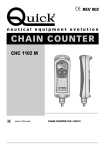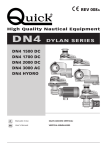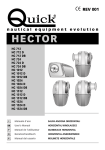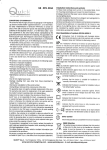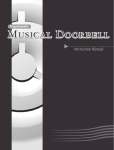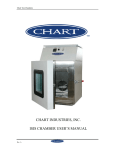Download CHAIN COUNTER - yachtshop.sk
Transcript
REV 003 nautical equipment evolution CHAIN COUNTER CHC 1202 M GB User’s Manual CHAIN COUNTER CHC 1202 M GB INDEX Pag. 4 CHARACTERISTICS AND INSTALLATION Pag. 5 INSTALLATION - Installing the laps sensor Pag. 6 INSTALLATION - Installing the magnet - Installing the sensor Pag. 7 INSTALLATION - Installing the chain counter Pag. 8 INSTALLATION - Panel-mounting - Installing the chain counter behind the panel Pag. 9 INSTALLATION - Electric connections Pag. 10 INSTALLATION - Installing the terminals Pag. 11 INSTALLATION - Chain counter calibration Pag. 12 CHAIN COUNTER OPERATION - Main window Pag. 13 CHAIN COUNTER OPERATION - Windlass electric drive Pag. 14 CHAIN COUNTER OPERATION - Monitoring Pag. 15 SETTING THE CHAIN COUNTER - The structure of the menus Pag. 16 SETTING THE CHAIN COUNTER - Settings menu - Counter reset / Functions Pag. 18 SETTING THE CHAIN COUNTER - Settings menu - Personal set Pag. 19 SETTING THE CHAIN COUNTER - Settings menu - Date and time Pag. 20 SETTING THE CHAIN COUNTER - Settings menu - Language / Calibration Pag. 22 SETTING THE CHAIN COUNTER - Settings menu - Automatic calibration Pag. 23 SETTING THE CHAIN COUNTER - Settings menu - Utility Pag. 25 SETTING THE CHAIN COUNTER - Settings menu - CAN configuration Pag. 26 SYSTEM ERRORS AND FAULTS Pag. 29 MAINTENANCE - TECHNICAL DATA GB CHARACTERISTICS AND INSTALLATION CHAIN COUNTER CHC 1202 M Our vast experience in the world of sailing has allowed us to design and develop the chain counter CHC 1202 M whose performance is widely superior to those of similar instruments available on today’s market. The chain counter CHC 1202 M allows the windlass to be activated to get the anchor aweigh or lower the anchor providing the exact measure of the chain lowered. Other important advantages which the chain counter offers, are: • Simple user-friendly interface. • Information displayed in 5 different languages. • Automatic lowering function. • Up alarm function. • Chain speed displayed. • Supply voltage displayed. • Equipped with clock/calendar. • Depth of chain lowered shown in meters or feet. • Graphic LCD display screen that can be easily read at various angles. • Backlight display screen with 8 brightness levels. • 8 different display contrast levels can be set. • Automatic display contrast compensation according to environmental temperature. • Universal power supply (12/24Vdc). • Backlight illuminated function keys. • CAN BUS interface for data transfer. • Capable of operating in a wide range of ambient temperatures. • Water-proof housing • Can be installed behind the panel. INSTALLATION BEFORE ATTEMPTING TO USE THE CHAIN COUNTER CAREFULLY READ AND BECOME FAMILIAR WITH THE CONTENTS OF THIS USER’S MANUAL. IF IN DOUBT, CONTACT YOUR NEAREST DEALER OR QUICK® CUSTOMER SERVICE. The Quick® chain counter has been designed and constructed solely for the tasks and purposes given in this User’s manual. Quick® company shall not be held responsible for any direct or indirect property damage caused by inappropriate use of the chain counter, incorrect installation or possible errors present in this manual. THE OPENING OF THE CHAIN COUNTER BY UNAUTHORIZED PERSONNEL MAKES THE WARRANTY VOID. THE PACKAGE CONTAINS: chain counter (and cover) - laps sensor kit - snap-on connector (to be used for connection to output terminals) - 150 ohm terminator - gasket - stud bolts and nuts for mounting - drilling templates - warranty card - this user’s manual. 4 INSTALLATION GB INSTALLING THE LAPS SENSOR Chain counter installation takes place in three steps: installation of the laps sensor on the windlass, mounting of the chain counter and electrical connections. Quick® windlasses All Quick® windlasses come with a laps sensor suitable for use with chain counter CHC 1202 M. Other windlasses In order for the chain counter to measure the exact length of the chain, it has to count the number of revolutions completed by the gear that drives the chain (gypsy). A laps sensor kit is supplied with the chain counter. This kit includes a cylindrical magnet, a magnetic field sensor and two plastic adaptors to be used to secure the sensor in place. The magnet is to be secured to the gypsy while the magnetic sensor is to be fixed to the windlass base. The standard installation procedure is described below. Unfortunately we cannot describe a procedure applicable to all types of situation. Adapt this procedure to satisfy your own individual requirements. EXAMPLES OF LAPS SENSOR INSTALLATION vertical windlasses 1 MAGNET 2 SENSOR 3 ADAPTOR 4 ADAPTOR 1 Max. 10 mm 3 2 horizontal windlasses ± 20° Max. 10 mm 1 2 4 Ideal installation 2 Maximum removal 5 GB INSTALLATION INSTALLING THE MAGNET Take the gypsy off the windlass (consult the user’s manual that deals with the windlass). Find the spot most suitable for the magnet housing based on the following criteria: • The magnet should not be installed in an area that the chain passes through (outer areas). • The location should be preferably made in the area where the gypsy is thickest (in order not to weaken the structure). • Regarding horizontal windlasses, make sure it is located near the edge of the gypsy. • Regarding vertical windlasses, make certain the sensor is installed on the base at the circumference “traced” by the magnet. • The magnet can protrude from the gypsy; make certain it does not interfere with the base or sensor. • The magnet should be as close to the sensor as possible. Once the hole has been drilled, glue the magnet inside it. Make sure the glue covers the part of the magnet still visible. Use glue designed for metals, resistant to brackish ambients and capable of withstanding temperatures ranging from –30 to +80 °C. Generally speaking, epoxy-based bi-component glues satisfy these requirements. Several magnets can be installed on the same gypsy to increase the precision with which the chain counter reads (not provided). Place any additional magnets around the same circumference equally spaced apart. INSTALLING THE SENSOR Locate the most suitable position to secure the sensor to the base according to the following criteria: • The sensor should not be installed in an area that the chain passes through. • If holes are made in the base, make sure they do not interfere with normal operation, do not weaken the structure or cause lubricant to flow out (windlasses with oil-bathed gears). • Regarding vertical windlasses, make certain the sensor can be installed on the base at the circumference “traced” by the magnet. • The magnet should be as close to the sensor as possible. Use the plastic adaptors provided to secure the sensor. Use a sheath to protect the sensor cables. Once installed, make sure the laps sensor works properly. Place the gypsy so that the magnet is aligned with the sensor and check electrical continuity between the two sensor cables. When the magnet is moved away from the sensor electrical continuity should no longer be present. 6 INSTALLATION GB INSTALLING THE CHAIN COUNTER The standard installation procedure is described below. Unfortunately we cannot describe a procedure applicable to all types of windlasses. Adapt this procedure to satisfy your own individual requirements. Find the spot most suitable for the chain counter based on the following criteria: • The chain counter should be in a position where the operator can easily read it. • Choose a clean, smooth and flat surface. • The operator must be able to access the chain counter from the back for installation and maintenance. • Enough space should be present behind the spot selected where the back of the chain counter and connectors are to be placed (space for the entire chain counter if installed behind the panel). • The back of the chain counter should be protected against humidity or water contact. • Pay careful attention when drilling holes in the panels or parts of the boat. These holes must not weaken the boat framework or cause cracks. • When installing the chain counter off the panel, the maximum allowable thickness of the surface is 20 mm (with the stud bolts provided). • When installing the chain counter behind the panel the maximum allowable thickness of the surface is 4 mm. The chain counter meets standard EMC (electromagnetic compatibility). In any case correct installation is fundamental in order not to affect its performance or interfere with operation of instruments found near it. For this reason the chain counter must be at least: • • • • • 25 cm away from the compass. 50 cm away from any radio receivers. 1 m away from any radio transmitters (except for SSB). 2 m away from any radio transmitters SSB. 2 m away from the path of the radar beam. 7 GB INSTALLATION Panel-mounting Once the mounting position has been selected, follow the directions given below: • Place the drill template (provided) on the surface where the chain counter will be installed. • Mark the center of each hole. • Drill the holes for the stud bolts with a 5 mm twisted drill. • Drill the hole for the back of the chain counter with a 56 mm diameter milling cutter. • Remove the template and any cutting burrs present at the holes. • Screw the stud bolts into the back of the chain counter. • Put the gasket in place on the chain counter. • Put the chain counter into place. • Tighten the two nuts provided to secure the chain counter to the panel. Installing the chain counter behind the panel Once the position of the chain counter has been selected, follow the steps given below: • Take off the chain counter frame as shown in the figure below. • Put the drilling template (provided) in the area where the chain counter will be installed. • Mark the center of each hole. • Drill the holes for the side keys with a 10 mm twisted drill. • Drill the hole for the middle key with a 7 mm twisted drill. • Make the rectangular opening for the chain counter’s display screen. • Remove the template and any cutting burrs present at the holes. • Secure the chain counter to the panel with two brackets (not provided). • Make sure the chain counter’s keys move in a trouble-free manner (they should not be obstructed or get stuck). 8 INSTALLATION GB ELECTRIC CONNECTIONS The chain counter meets standard EMC (electromagnetic compatibility). In any case correct installation is fundamental in order not to affect its performance or interfere with operation of instruments found near it. For this reason the chain counter must be at least: • 1 m away from cables that transmit radio signals (except for SSB radio transmitters). • 2 m away from cables for SSB radio transmitter signals. Follow the safety precautions and directions given below when making the electrical circuit of the chain counter: • Turn on power to the chain counter only after having effected and verified that all the electric connections are correct. • Use the snap-on connectors provided to connect the cables to the chain counter. • Install a switch to turn on and shut off the chain counter; make sure the switch is in a position that can be easily reached so that, in the event of an emergency, the chain counter can be quickly shut off. • Install a 4A fast fuse in the chain counter’s power supply line. • The cross-section of the solenoid/reversing solenoid unit and chain counter’s power supply cables should be adequately sized according to the length of the cables. • Do not run the chain counter on power delivered from the motors’ batteries. • Use an unscreened cable with twisted pair (cross-section area 0.25/ 0.35 mm2 AWG 22/24, impedance 100/150 ohm) for the data interface connection (CANH and CANL signals). • The data cable should not be more than 100 meters long. • The boat’s electrical system should allow other switches to operate the windlass. THE WIRING DIAGRAM UP SOLENOID UNIT/ REVERSE SOLENOID UNIT WINDLASS OPERATE SWITCH DOWN UP POWER SUPPLY SWITCH DOWN FUSE 4A FAST CA NL CAN H UP DOWN R SO SEN CA NL R SO SEN CAN H CA NL R SO SEN UP DOWN 150 CAN H 150 BATTERY 12/24 V UP DOWN GYPSY SENSOR 9 GB INSTALLATION INSTALLING THE TERMINALS In order for data to be correctly transmitted when several chain counters are employed, terminator (150 ohm) must be installed. The terminator should be connected between signals CANH and CANL of the first and last chain counter included in the network, as illustrated in the figure below: 150 CA NL R SO SEN CA NL R SO SEN CA NL R SO SEN 1 CAN H CAN H CAN H CA NL CAN H R SO SEN UP DOWN UP DOWN UP DOWN 2 UP DOWN 3 4 150 UP DOWN 19 INSTRUMENTS FROM 5 TO 16 UP DOWN 18 Do not install the terminator if just one chain counter is used. 10 CA NL R SO SEN CA NL R SO SEN CA NL R SO SEN 20 CAN H CAN H CAN H CAN H CA NL R SO SEN UP DOWN UP DOWN 17 INSTALLATION GB CHAIN COUNTER CALIBRATION Before using the chain counter, either the manual or automatic calibration procedure has to be effected. The calibration procedure consists of setting the following data: unit of measurement used by the chain counter, lenght of chain unwound each gypsy lap and number of magnets installed on the gypsy. To calibrate, go to menu CALIBRATION or AUTO CALIBRATE (see chapter SETTING THE CHAIN COUNTER). MULTIPLE CHAIN COUNTERS The chain counter is equipped with a CAN BUS data interface that allows several chain counters to be connected and information to be exchanged (CAN network). A MASTER/SLAVE network structure is used, i.e. there is only one main chain counter (MASTER) and all the other chain counters are secondary (SLAVE). The network must have at least one MASTER chain counter. The task of the MASTER chain counter is to align the length of the chain lowered and operating parameters of all the SLAVE chain counters. The MASTER therefore is used as a reference for all the other SLAVE chain counters. If a parameter in a menu for a SLAVE chain counter is modified, the change is actually made to the MASTER chain counter that will automatically update all the SLAVE chain counters (except for menu PERSONAL SET, UTILITY and CAN CONFIG that cointain particular functions and parameters for every single chain counter not shared in network with the other chain counters). The MASTER chain counter should be on even if the commands to the windlass are transmitted from SLAVE chain counters or other windlass operation switches. If the MASTER chain counter should malfunction, one of the SLAVE chain counters can be set up as the MASTER. Before using the chain counters on the CAN network, make sure the MASTER and SLAVE settings of all the chain counters are correct and that the network works in a trouble-free manner. 11 GB CHAIN COUNTER OPERATION CHAIN COUNTER OPERATION Three elements are employed between user and counter interface: A GRAPHIC DISPLAY SCREEN, CONTROL KEYS AND BUZZER. The display screen shows the measure of chain lowered, state of the chain counter along with other information. The control panel comes with three keys. The two largest keys are used to move the anchor up (5,UP key) or down (6,DOWN key), move within the system menus or modify the value of parameters. The middle key (=SELECT) is used to select the monitoring mode, go to the system menus or confirm parameters. The buzzer signals when the keys have been pressed or when it is necessary to call the user’s attention. Use the switch on the power supply line to turn the chain counter on and off. When the chain counter is turned on, the following window is displayed for a few seconds: CHC1202M S/N : XXXXX/YYZZ Where XXXXX is the serial number, YY is the week of production and ZZ is the year the chain counter was produced. When the chain counter is turned on the first time, the menu used to select the language in which messages are displayed appears. The selected language can be changed later on. MAIN WINDOW Once the initialization procedure has been completed, the main window is displayed: State line Icon area Count line Monitor line WED JAN Measure unit area This window is divided into the following sections: Count line The length of the chain lowered is shown in this area. Measure unit area The unit of measurement currently being used is shown in this area. The values may be displayed in “M” for meters and “FT” for feet. State line Messages regarding the state of the chain counter or faults detected are shown here. Icon area The icons regarding the state of the chain counter or faults detected are shown here. Monitor line The following information may be displayed here, depending on the selections made by the user: date and time, supply voltage and chain speed. 12 CHAIN COUNTER OPERATION GB WINDLASS ELECTRIC DRIVE Getting the anchor aweigh To get the anchor aweigh press key 5 (UP). Hold the key pressed until the anchor reaches the desired position and then release it. While moving up, the chain counter displays a window similar to the one shown below: CHAIN UP SPEED 82 M / M It is also possible to get the anchor aweigh with an other electric control. The chain counter will measure the length of the chain lowered in any case. Lowering the anchor To lower the anchor press key 6 (DOWN). Hold the key pressed until the anchor reaches the desired position and then release it. While moving down, the chain counter displays a window similar to the one shown below: CHAIN DOWN SPEED 82M / M It is also possible to lower the anchor with an other electric control. The chain counter will measure the length of the chain lowered in any case. Automatic down function This function can be used only if it was previously set and activated on the FUNCTIONS\AUTO DOWN menu (see chapter SETTING THE CHAIN COUNTER). ATTENTION: regular operation of the windlass has to be checked when moving down automatically To lower the anchor automatically to the set depth, press keys = (SELECT) and 6 (DOWN) simultaneously for more then three seconds. Once the procedure has started, both keys can be released. The chain counter will lower the anchor to the set depth. While moving down automatically, the chain counter displays a window similar to the one shown below: AUTO DOWN SPEED 82 M / M The automatic lowering procedure can be interrupted by pressing any key of the chain counter from which the procedure was activated, by activating the up function from an external device (from another chain counter or other control) or by shutting off the chain counter. 13 GB CHAIN COUNTER OPERATION Free fall At times the anchor may have to be lowered by wanting the windlass to free fall (without electrical command). The chain counter will measure the length of the chain lowered under these circumstances as well. A window similar to the one shown below appears during free fall: FREE FALL SPEED 82 M / M MONITORING The information shown on the monitor line can be changed by pressing and releasing key = (SELECT) in less than one second. The following data can be displayed: date and time, supply voltage and chain speed. The date and time are stored even when the chain counter is shut off (it is equipped with a buffer battery). The precision of the supply voltage reading is ± 2% while the chain speed reading is ±1% accurate. STOP MON 30 SEP 15:32 STOP BATTERY 12.8V STOP SPEED 14 0 M/M SETTING THE CHAIN COUNTER GB SETTING THE CHAIN COUNTER The chain counter has a several functions that can be personalized to satisfy user’s requirements. To go to the setting menu, press and release key = (SELECT) for more than 3 seconds. As soon as the key is released a window similar to the one shown below is displayed: SETTINGS COUNTER RESET FUNCTIONS PERSONAL SET DATE AND TIME LANGUAGE CALIBRATION Use keys 5 and 6 (UP and DOWN) to select the data items within the menu. The data item that has been currently selected appears in reverse. Use key = (SELECT) to confirm the selected data item. The following data items are provided on the settings menu, with the MASTER chain counter present on the network: DATA ITEM SYNTHETIC DESCRIPTION COUNTER RESET FUNCTIONS PERSONAL SET DATE AND TIME LANGUAGE CALIBRATION AUTO CALIBRATE UTILITY CAN CONFIG EXIT Measure of chain lowered reset. Automatic down and up alarm setting. Chain counter personalization: contrast, back-lighting, light delay, key beep System date and time setting Language used for system messages Chain counter calibration: unit of measurement, number of magnets installed, gypsy lap Automatic chain counter calibration Various chain counter controls MASTER/SLAVE setting if more than one chain counter is used Chain counter set-up menu exit The structure of the menus COUNTER RESET FUNCTIONS UP ALARM AUTO DOWN PERSONAL SET DATE AND TIME LANGUAGE CONTRAST LIGHT LIGHT DELAY KEY BEEP ENGLISH ITALIANO FRANCAIS DEUTSCH ESPANOL CALIBRATION AUTO CALIBRATE UTILITY SET MEASURE GYPSY LAP MAGNETS NUMBER SENSOR TEST LCD TEST CLOCK BATTERY SW VERSION CAN CONFIG SET DEFAULT CHECK FLASH CHECK EEPROM EXIT CAN MESSAGE 15 GB SETTING THE CHAIN COUNTER If a SLAVE chain counter is being used without the MASTER in the CAN network, the following “reduced” settings menu will be displayed: SETTINGS PERSONAL SET UTILITY CAN CONFIG EXIT These submenus have particular parameters and functions for every single counter which can not be shared with other chain counters present on the CAN network. COUNTER RESET SETTINGS MENU - COUNTER RESET Use this option to reset the measure of chain lowered. This option is to be used during installation or when the chain counter’s reading does not match the actual length of the chain lowered. When this data item is selected, the following window is displayed: ARE YOU SURE? YES NO YES or NO can be selected. Used to select the values available. Confirm entry and go back to SETTINGS menu. FUNCTIONS UP ALARM AUTO DOWN EXIT SETTINGS MENU - FUNCTIONS Use this option to activate and set the up alarms and automatic down. The sub-menu of the FUNCTIONS option is shown below: Used to select the data items in the sub-menu. Press this key to go to the menu shown in REVERSE; if used to EXIT the system goes back to the SETTINGS menu. SETTINGS MENU - FUNCTIONS - UP ALARM Use this option to set or disable the up alarm. This function stops the anchor from moving up and informs the user when the length of the chain lowered is less than the set value. ATTENTION: the up alarm function is active only by using a chain counter CHC 1202 M controls when the anchor moves up. It does not function if the anchor is moved up by any other remote control or a switch. ATTENTION: the chain counter is not able to compensate for mechanical inertia of the windlass (the gypsy can rotate upward direction as soon as the command has been inactivated). Take this factor into consideration when setting the up alarm value. ATTENTION: the alarm is displayed only once, if the chain measure lowered than the alarm threshold. 16 SETTING THE CHAIN COUNTER GB ATTENTION: leven if the up alarm is enabled, the user must always pay careful attention and make sure the anchor is correctly pulled up. Examples of the windows used for the up alarm are shown below: UP ALARM SET VALUE: OFF UP ALARM SET VALUE: 1.0 M default: OFF If the unit of measurement is set to METERS , the settable values are OFF, 1.0M, 1.5M, 2.0M, 2.5M, 3.0M, 3.5M, 4.0M, 4.5M, 5.0M. If the unit of measurement is set to FEET, the settable values are OFF, 3.0F, 4.5F, 6.0F, 7.5F, 9.0F, 10.5F, 12.0F, 13.5F, 15F. Increase Decrease Confirm value and go back to FUNCTIONS menu. SETTINGS MENU - FUNCTIONS - AUTOMATIC DOWN The automatic down function is enabled or disabled with this option. This function allows the anchor to automatically move down to the set depth (see chapter CHAIN COUNTER OPERATION paragraph AUTOMATIC DOWN FUNCTION). ATTENTION: the chain counter is not able to compensate for mechanical inertia of the windlass (the gypsy can rotate downward direction as soon as the command has been inactivated). Take this factor into consideration when setting the automatic down value. ATTENTION: even if the automatic down function is enabled, the user must always pay careful attention and make sure the anchor is correctly lowered. AUTO DOWN SET VALUE: OFF AUTO DOWN SET VALUE: 5M Examples of the windows used for the automatic down function are shown below: default: OFF If the unit of measurement is set to METERS, the settable values are OFF, from 5M to 100M with 5M steps. If the unit of measurement is set to FEET, the settable values are OFF, from 15T to 300F with 15F steps. Increase Decrease Confirm value and go back to FUNCTIONS menu. 17 GB SETTING THE CHAIN COUNTER PERSONAL SET CONTRAST LIGHT LIGHT DELAY KEY BEEP EXIT SETTINGS MENU PERSONAL SET This option allows the user to enable and set several functions to personalize the chain counter. The PERSONAL SET sub-menu is shown below. Selects the data items in the sub-menu. Press this key to go to the menu shown in REVERSE; if EXIT has been selected the system goes back to the SETTINGS menu. SETTINGS MENU - PERSONAL SET CONTRAST Use this option to adjust the contrast of the LCD. The change is immediately made without having to confirm the value. CONTRAST SET VALUE: 4 Selectable values: 1, 2, 3, 4, 5, 6, 7, 8. (default: 4). Increase Decrease Confirm value and go back to PERSONAL SET menu. LIGHT SET VALUE: 4 SETTINGS MENU - PERSONAL SET LIGHT Use this option to adjust the back-lighting of the display screen. The brightness is immediately changed without having to confirm the value. Selectable values: OFF,1, 2, 3, 4, 5, 6, 7, 8. (default: 4). Increase Decrease Confirm value and go back to PERSONAL SET menu. 18 SETTING THE CHAIN COUNTER LIGHT DELAY SET VALUE: GB SETTINGS MENU - PERSONAL SET LIGHT DELAY Use this option to set the delay time for shutting off the back-lighting of the display screen. The delay time starts to elaps as soon as the last key is released (or when FREE FALL is completed). Selectable values: 30S, 60S, 90S, 120S, 180S, 240S, ON (always on). (default: 30S). 30S Increase Decrease Confirm value and go back to PERSONAL SET menu. SETTINGS MENU - PERSONAL SET KEY BEEP Use this option to activate or deactivate the beep that sounds whenever a key is pressed. KEY BEEP SET VALUE: YES NO Selectable options: YES and NO. (default: YES). Select the values available. Confirm value and go back to PERSONAL SET menu. DATE AND TIME SETTINGS MENU DATE AND TIME Use this option to set the clock and calendar. The DATE AND TIME window appears as follows: SET VALUE: 2003 JAN 03 00:00 EXIT Increase Decrease Confirm value and go to next parameter; if EXIT has been selected the system goes back to SETTINGS menu. 19 GB SETTING THE CHAIN COUNTER SETTINGS MENU LANGUAGE Use this option to select the language in which the system messages are displayed. The LANGUAGE sub-menu appears as shown below. LANGUAGE ENGLISH ITALIANO FRANCAIS DEUTSCH ESPANOL Select the data items. Confirm value and go back to SETTINGS menu. CALIBRATION SET MEASURE GYPSY LAP MAGNETS NUMBER EXIT SETTINGS MENU CALIBRATION Use this option to calibrate the chain counter according to the windlass it is mounted on. The CALIBRATION sub-menu appears as follows: Select the data items in the menu. Confirm value and go to next parameter; if EXIT has been selected the system goes back to SETTINGS menu. SETTINGS MENU - CALIBRATION SET MEASURE Use this option to select the unit of measurement relative to measurement of chain lowered. SET MEASURE SET VALUE: METERS FEET Selectable options: METERS or FEET. (default: METERS). Select the values available. Confirm value and go back to CALIBRATION menu. 20 SETTING THE CHAIN COUNTER GB SETTINGS MENU - CALIBRATION - GYPSY LAP Use this option to set the measurement of the chain in one gypsy lap. To obtain this value, remove the gypsy, wind the chain around it and then measure its length. GYPSY LAP Consult the User’s manual of the windlass for more detailed instructions on how to remove and re-install the gypsy. It is extremely important that the value set for GYPSY LAP is precise as it affects the accuracy with which the length of the lowered chain is measured GYPSY LAP SET VALUE: 10.0 INC If the unit of measurement is set to FEET, the settable values are from 1.0 to 999.0 inc (default: 10 inc). GYPSY LAP SET VALUE: 10.0 CM If the unit of measurement is set to METERS, the settable values are from 1.0 to 999.9 cm (default: 10 cm). Increase Decrease Confirm value and go back to CALIBRATION menu. MAGNETS NUMBER SETTINGS MENU - CALIBRATION - NUMBER OF MAGNETS Use this option to set the number of magnets installed on the gypsy. SET VALUE: 1 Selectable Values: 1 to 16. (default: 1). Increase Decrease Confirm value and go back to CALIBRATION menu. 21 GB SETTING THE CHAIN COUNTER AUTO CALIBRATE SET VALUE: METERS FEET SETTINGS MENU - AUTOMATIC CALIBRATION Use this option to automatically calibrate the chain counter. The first window regarding AUTOMATIC CALIBRATION is shown below: Use this option to select the unit of measurement used to measure the chain lowered. Selectable values: METERS or FEET. EXIT Select the values available. Confirm value and go to next window for AUTOMATIC CALIBRATION procedure, if EXIT is selected the system goes back to menu SETTINGS. AUTO CALIBRATE PRESS UNTIL 6M DEPTH PRESS TO EXIT AUTO CALIBRATE PRESS UNTIL 20FT DEPTH This window tells the user the chain has to be lowered 6 meters (or 20 feet, depending on the unit of measurement selected) in an uninterrupted manner. The length of the chain unwound each lap can be calculated according to the number of laps completed by the gypsy (counted by the chain counter). PRESS TO EXIT Not active Chain down; it counts the number of gypsy laps. Cancel procedure and go back to SETTINGS menu. Once key 6 (DOWN) is released the chain counter will stop the chain from moving down and automatically set the following values: GYPSY LAP CM=600/number of laps counted NUMBER OF MAGNETS=1 GYPSY LAP CM=240/number of laps counted NUMBER OF MAGNETS=1 After which the following window will be displayed for two seconds: AUTO CALIBRATE END OF PROCEDURE 22 And the SETTINGS menu will be shown again. SETTING THE CHAIN COUNTER UTILITY SENSOR TEST LCD TEST CLOCK BATTERY SW VERSION SET DEFAULT CHECK FLASH UTILITY SW VERSION SET DEFAULT CHECK FLASH CHECK EEPROM CAN MESSAGE EXIT GB SETTINGS MENU UTILITY This option allows the user to perform procedures to check and control the chain counter operation. The UTILITY sub-menu appears as shown below: Select data items from sub-menu Press this key to go to the menu shown in REVERSE; if EXIT has been selected the system goes back to the SETTINGS menu. SENSOR TEST SENSOR STATUS: ON SENSOR TEST SETTINGS MENU - UTILITY SENSOR TEST This function can be used during installation or to check that the lap sensor works properly. If the sensor detects the magnet, ON is displayed and the buzzer sounds; otherwise OFF is displayed and the buzzer does not sound. SENSOR STATUS: OFF Go back to UTILITY SETTINGS MENU - UTILITY -LCD TEST This function can be used to check correct operation of the LCD display’s pixels. Once the data item has been confirmed from the utility menu, all the display pixels will be activated for 5 seconds; after which the system will go back to menu UTILITY. CLOCK BATTERY CLOCK BATTERY X.XX VDC SETTINGS MENU - UTILITY CLOCK BATTERY This function displays the voltage of the clock’s buffer battery. Go back to UTILITY menu. 23 GB SETTING THE CHAIN COUNTER SETTINGS MENU - UTILITY SW VERSION This function displays the software version installed in the chain counter. SW VERSION SW VERSION VX.X Go back to UTILITY menu. SET DEFAULT ARE YOU SURE? YES NO SETTINGS MENU - UTILITY SET DEFAULT This function allows the user to enter the default values and restart the chain counter. The SET DEFAULT window appears as shown below: YES or NO can be entered. Select data items from sub-menu. Confirm value. SETTINGS MENU - UTILITY CHECK FLASH (PROGRAM MEMORY) This function shows the calculated FLASH memory checksum (SUM) and the one stored during production (TRUE). CHECK FLASH CHECK FLASH TRUE: XXXX SUM: YYYY In order for the chain counter to operate properly the two values must match. Go back to UTILITY menu. 24 SETTING THE CHAIN COUNTER GB SETTINGS MENU - UTILITY CONTROL EEPROM (DATA MEMORY) This function shows the calculated EEPROM memory checksum (SUM) and the one stored (TRUE). CHECK EEPROM CHECK EEPROM TRUE: XXXX SUM: YYYY In order for the chain counter to operate properly the two values must match. Go back to UTILITY menu. CAN MESSAGE TX MSG: RX MSG: LAST ID: CAN UPD: 000 000 000 000 SETTINGS MENU - UTILITY CAN MESSAGE This function shows some information regarding CAN messages transmission state. Go back to UTILITY menu. SETTINGS MENU CAN CONFIGURATION This option allows the user to determine chain counter’s priority in the CAN network (see chapter MULTIPLE CHAIN COUNTERS). CAN CONFIG SET VALUE: MASTER SLAVE MASTER and SLAVE can be entered (default: MASTER). Select the values available. Confirm entry and go back to SETTINGS menu. 25 GB SYSTEM ERRORS AND FAULTS SYSTEM ERRORS System errors may arise when the chain counter chain counter is turned on. Checksum error The following windows are displayed if the counter detects an error in the memorized data: CONTROL CHECKSUM FLASH CHECKSUM ERROR CONTROL EEPROM EEPROM CHECKSUM ERROR TRUE: XXXX TRUE: XXXX SUM: YYYY SUM: YYYY FLASH memory checksum error EEPROM memory checksum error If one of these messages appears do not use the chain counter and contact a service center or QUICK® customer service without delay. Multi Master error If the chain counter detects more then one of MASTER chain counters in the CAN network, the following window is displayed: Select chain counter’s priority in the CAN network (see chapter MULTIPLE CHAIN COUNTERS). MULTI MASTER ERROR SET VALUE: MASTER SLAVE SYSTEM FAULTS System faults that appear on the state line divided into three categories which are shown below: problems with automatic reset, problems with automatic reset and keys locked and problems with manual reset. PROBLEMS WITH AUTOMATIC RESET These faults are automatically reset as soon as the cause that had generated the problem disappears. Low voltage This fault is displayed if the voltage drops below 10.5Vdc for more than one second. Reset takes place if the voltage is higher than 11.0Vdc for more than one second. Check the charge level of the batteries that supply voltage or the electrical system. The window shown below appears when this problem is present: Clock battery low This fault is displayed if the voltage of the clock battery drops below 2.80Vdc. The chain counter checks the battery voltage when turned on and every half hour. The problem is reset if the voltage is higher than or equal to 2.80Vdc. The clock battery can be replaced only at an authorized service center. The window shown below appears when this problem is present: 26 LOW VOLTAGE SPEED 0M/M CLOCK BAT LOW SPEED 0M/M SYSTEM FAULTS No MASTER This fault is displayed if there is not a chain counter with MASTER priority in the CAN network (see chapter MULTIPLE CHAIN COUNTERS). See if the MASTER chain counter is on and the data line connections. The window shown below appears when this problem is present: NO MASTER CAN BUS communication error This fault is displayed if there are errors that cannot be recovered during CAN network communication. Make sure the data cables are properly connected. The window shown below appears when this problem is present: CAN ERROR SPEED SPEED GB 0M/M 0M/M PROBLEMS WITH AUTOMATIC RESET AND KEYS LOCKED These faults are automatically reset as soon as the cause that had generated the problem disappears. Some keys are disabled when these faults are present. Opposed commands This fault is displayed if keys UP or DOWN are pressed at the same time as the respective external control DOWN or UP key (other chain counters or other remot switch). If the fault is present keys 5,6 (UP, DOWN) are disabled. The window shown below appears when this problem is present: Overload This fault is signaled when the instrument detects at short circuit or overload at the instrument's output. Check wiring of signals UP and DOWN and absorption of the points of use connected to the instrument’s output. If a fault is present, keys, 5,6 (UP, DOWN) are inoperative. A window similar to the one shown below appears if a fault is present: Remote programming active This fault is displayed if a chain counter has entered the SETTINGS menu in the CAN network (see chapter MULTIPLE CHAIN COUNTERS). Wait until the chain counter has exit the menu. If the fault is present key = (SELECT) is disabled The window shown below appears when this problem is present: OPPOSED SPEED 0M/M OVERLOAD SPEED 0M/M REMOTE PROG SPEED 0M/M 27 GB SYSTEM FAULTS PROBLEMS WITH MANUAL RESET These problems are reset by the user: by pressing key = (SELECT) or turn off the chain counter and turn it back on. If the fault is present keys 5, 6(UP, DOWN) are disabled. Up alarm This fault is displayed if the length of the chain is less than the value set on the FUNCTIONS\UP ALARM menu. The window shown below appears when this problem is present: No sensor This fault is displayed if the laps sensor does not detect the gypsy movement within four seconds when key 5 or 6 (UP or DOWN ) of the chain counter or other switches are pressed. Check the distance between the magnet and sensor, operation of the laps sensor and the wiring/connections. The window shown below appears when this problem is present: Sensor failure This fault is displayed if the chain counter detects a short circuit in the sensor for more than four seconds when key 5 or 6 (UP or DOWN ) of the chain counter or other switches are pressed. Check operation of the laps sensor and the wiring/connections. The window shown below appears when this problem is present: UP ALARM SPEED 0M/M NO SENSOR SPEED 0M/M SENSOR FAILUR SPEED 0M/M CONFIRMATION MESSAGES Confirmation messages that may appear on the state line are shown below. STOP Stop When no commands are sent to the windlass, the following window is displayed: Memory stored As soon as four seconds elapsed from the last operation was completed (up, down, automatic down, free fall), the chain counter stores the length of the lowered chain in the EEPROM memory. The window shown below is displayed while the data are being saved: 28 SPEED 0M/M MEMORY STORED SPEED 0M/M MAINTENANCE - TECHNICAL DATA GB MAINTENANCE The chain counter does not require any particular maintenance. To assure top performance, check the cables and electrical connections once a year. Clean the chain counter with a soft rag dampened in water. Do not use chemicals or harsh products to clean the chain counter. TECHNICAL DATA MODEL CHC 1202 M OUTPUT CHARACTERISTICS UP/DOWN contacts current 5A max - 2A in continuous External connections Gold plated male snap-on connector INPUT CHARACTERISTICS from 9 to 30 Vdc Supply voltage (1) Current absorbed when idling (2) Maximum current absorbed (3) 35 mA 150 mA + current used by solenoid/reversing solenoid unit AMBIENT CHARACTERISTICS -20 ÷ +70 °C Operating temperature (4) Degree of protection (5) IP 67 CASE Dimensions (WxHxD) 90 x 94 x 25 [38] mm (94 x 97 x 28 [42] mm with cover) 172 g (204 g with cover) Weight GENERAL Communication interface CAN BUS with differential transceiver Clock battery EMC class (1) (2) (3) (4) (5) CR2032 (3Vdc) EN 55022/B The chain counter can reset itself if the voltage is less than 9 Vdc. Typical value with back-lighting off and windlass not on. Typical value with back-lighting on at highest level and windlass on. With temperatures below 0°C the crystals in the LCD slow down. Except for the area where the electric contacts are connected (IP 00). QUICK® RESERVES THE RIGHT TO MODIFY THE TECHNICAL CHARACTERISTICS OF THE EQUIPMENT AND THE CONTENTS OF THIS MANUAL WITHOUT PRIOR NOTICE. 29 94 CHC 1202 M - DIMENSIONS (mm) 90 38 SENSOR FUSE 4A FAST 150 UP DOWN CA NL UP DOWN CA NL UP DOWN DOWN UP WINDLASS OPERATE SWITCH 150 UP DOWN CA NL GYPSY BATTERY BATTERIE 12/24 V POWER SUPPLY SWITCH SOLENOID UNIT/ REVERSE SOLENOID UNIT THE WIRING DIAGRAM R SO SEN CAN H CAN H R SO SEN R SO SEN CAN H CMCNTCHCNR03 QUICK® - VIA PIANGIPANE , 120/A - 48020 PIANGIPANE (RAVENNA) - ITALY TEL. +39.0544.415061 - FAX +39.0544.415047 www.quickitaly.com - E-mail: [email protected]
































